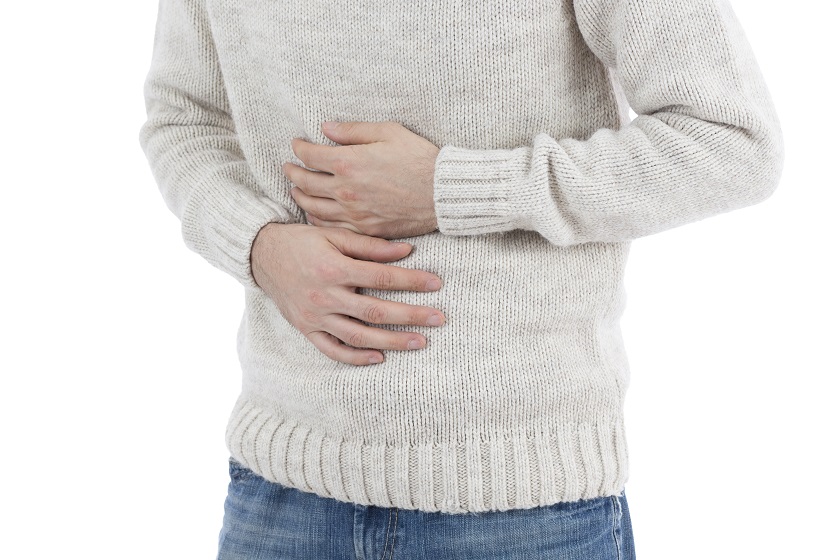“Typically patients who present at emergency departments with kidney stones want to walk around to relieve the pain, as opposed to wanting to lie down, which is what patients in severe pain usually want to do,” Paul says.
Kidney stones don’t usually cause these symptoms while in the kidney. Severe pain (renal colic) comes when a stone moves down, irritating and sometimes blocking the ureter (the small tube between the kidney and the bladder).
What are kidney stones?
Kidney stones form when there is an incorrect mix of components in the urine, allowing salts to form into crystals.
Most stones are made of calcium and they can vary in size, shape and location although most are small and are passed out with the urine. Some, however, can grow over time and become quite large.
Who can develop kidney stones?
Paul says anyone can develop kidney stones, but they are four times more common in men than women and usually occur between the ages of 20 and 60.
“Genetics seem to play a role as well, with kidney stones occurring more commonly in patients with Mediterranean and European backgrounds," he says.
“They are also more likely to occur if you become dehydrated as this causes the urine to become more concentrated. You are more prone to develop kidney stones if you have repeated urine or kidney infections, a kidney with scars or cysts on it or a family history of kidney stones.”
How do I know if I have a kidney stone?
You may feel a strong gripping pain in the back, or around into the groin and thigh. Often people say they can’t keep still due to the pain. Other symptoms may include blood in your urine, nausea, vomiting and sweating.
The pain usually comes and goes but can be constant and may last hours. Usually it will settle when the stone passes into the bladder. Most stones are not painful to pass from the bladder.
Urine infections are more common and concerning in people with kidney stones. Infections can cause fever, pain upon passing urine and increased frequency of passing urine.
Treating kidney stones
Paul says when you arrive at the Emergency Department, the highest priority is usually pain relief.
“This may involve an intravenous opiate medication, such as morphine, and or an anti-inflammatory medication," he says.
“When considering the diagnosis of kidney stones, the most pressing issues are to ensure the diagnosis is correct, and then to decide how big the stone is, and its location.
“A CT scan is the best imaging modality for the assessment of kidney stones – telling us where and how big the stone is.
“Stones that are relatively small and low down (close to the bladder) usually pass by themselves without the need for medical intervention.
“Larger stones, or those stuck higher up, may need to be removed in an operating theatre by a specialist urologist.”
Other considerations in the Emergency Department include blood tests to monitor kidney function and consideration of the possibility of underlying infection accompanying the stone.
“When patients are comfortable, having had some good pain relief, and had their imaging completed they are usually able to be treated at home," he says.
“Most people will pass the stone without any problems in a few days to weeks. You may not even be aware that you have passed a stone.”
What to do when you leave the emergency department
Paul says all patients with kidney stones should be followed up by a specialist urologist or a GP who knows them well.
“We recommend this so they can detect stones that may not have passed or caused complications and to work out what to do to prevent stones in the future," he says.
“It is also important to try to collect your stone so that it can be tested to find the cause of the stones.
“You can collect your stone by urinating into an ice cream container or straining it through a sieve. If you pass a stone, dry it and keep it in a clean glass jar to take to your doctor to have it tested.”
Can you prevent kidney stones?
If you have had a kidney stone, you have a higher chance of developing one in the future.
You can try to prevent a recurrence by:
- Keeping your fluid intake up so you don’t become dehydrated
- Avoiding urinary tract infections by getting quick and proper treatment, as urinary infections can cause kidney stones
- Limiting intake of tea or coffee
- Limiting intake of drinks with phosphoric acid, such as soft drinks and beer
- Changes in diet are only advised for some causes of kidney stone.
Talk about concerns with your family doctor or urologist prior to making diet changes.
When should you seek medical help?
Return to the ED or your local doctor if you have:
- Pain worsening despite taking painkillers
- Repeated vomiting
- Fever, sweats and shivers
- Urine that is cloudy or smelly
- Pain on passing urine
- Any other concerns


